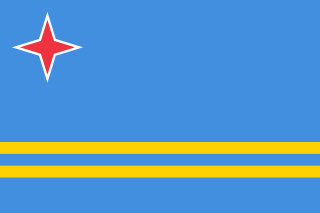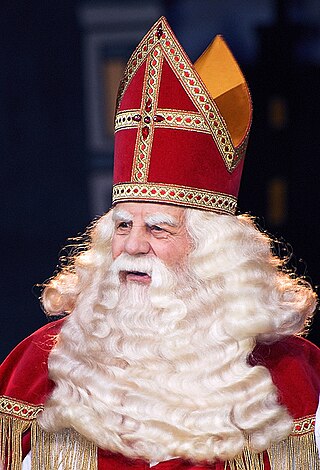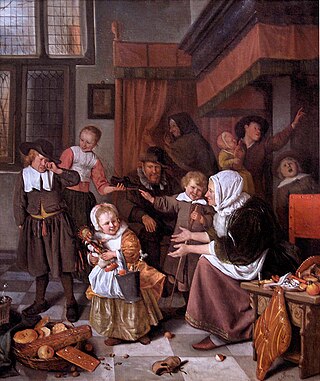
Aruba, officially the Country of Aruba, is a constituent island country within the Kingdom of the Netherlands, in the southern Caribbean Sea 29 kilometres (18 mi) north of the Venezuelan peninsula of Paraguaná and 80 kilometres (50 mi) northwest of Curaçao on the South-American continent. In 1986, Aruba became a constituent country within the Kingdom of the Netherlands and acquired the formal name the Country of Aruba.

Carnival or Shrovetide is a festive season that occurs at the close of the Christian pre-Lenten period, consisting of Quinquagesima or Shrove Sunday, Shrove Monday, and Shrove Tuesday or Mardi Gras.
Meteņi or Metenis is an ancient Latvian spring waiting holiday, that ends on Ash Wednesday, which is followed by Lent. Meteņi is celebrated in February or early March, seven weeks before Lieldienas.

Midsummer is a celebration of the season of summer, taking place on or near the date of the summer solstice in the Northern Hemisphere; the longest day of the year. The name "midsummer" mainly refers to summer solstice festivals of European origin. In these cultures it is traditionally regarded as the middle of summer, with the season beginning on May Day. Although the summer solstice falls on 20, 21 or 22 June in the Northern Hemisphere, it was traditionally reckoned to fall on 23–24 June in much of Europe. These dates were Christianized as Saint John's Eve and Saint John's Day. It is usually celebrated with outdoor gatherings that include bonfires and feasting.

In the Gregorian calendar, New Year's Eve refers to the evening, or commonly the entire day, of the last day of the year, 31 December, also known as Old Year's Day. In many countries, New Year's Eve is celebrated with dancing, eating, drinking, and watching or lighting fireworks. Many Christians attend a watchnight service to mark the occasion. New Year's Eve celebrations generally continue into New Year's Day, 1 January, past midnight.

A national day is a day on which celebrations mark the statehood or nationhood of a state or its people. It may be the date of independence, of becoming a republic, of becoming a federation, or a significant date for a patron saint or a ruler.

Sinterklaas or Sint-Nicolaas is a legendary figure based on Saint Nicholas, patron saint of children. Other Dutch names for the figure include De Sint, De Goede Sint and De Goedheiligman. Many descendants and cognates of "Sinterklaas" or "Saint Nicholas" in other languages are also used in the Low Countries, nearby regions, and former Dutch colonies.

The King's Official Birthday is the selected day in most Commonwealth realms on which the birthday of the monarch is officially celebrated in those countries. It does not necessarily correspond to the date of the monarch's actual birth.

Saint Nicholas Day, also called the "Feast of Saint Nicholas", observed on 6 December in Western Christian countries, and on 19 December in Eastern Christian countries using the old church Calendar, is the feast day of Saint Nicholas of Myra; it falls within the season of Advent. It is celebrated as a Christian festival with particular regard to Saint Nicholas' reputation as a bringer of gifts, as well as through the attendance of church services.
The national holidays in the Netherlands are:

The culture of Aruba, encompassing its language, music, and cuisine, is diverse and has been influenced by both regional and foreign cultures. One significant foreign influence originates from the Iberian Peninsula, which had a significant impact on the island for approximately 137 years, starting c. 1500. These influences were characaterized by a strong religious presence, missionary activities, and economic exploitation.

Emancipation Day is observed in many former European colonies in the Caribbean and areas of the United States on various dates to commemorate the emancipation of slaves of African descent.

The observance of Christmas around the world varies by country. The day of Christmas, and in some cases the day before and the day after, are recognized by many national governments and cultures worldwide, including in areas where Christianity is a minority religion which are usually found in Africa and Asia. In some non-Christian areas, periods of former colonial rule introduced the celebration ; in others, Christian minorities or foreign cultural influences have led populations to observe the holiday.

Below are some of common festivities associated with, or observed by the Dutch ethnic group. Included are cultural feasts. National holidays, of for example the Netherlands are omitted. Major festivities include:

The Kingdom of the Netherlands, commonly known simply as the Netherlands, is a sovereign state consisting of a collection of constituent territories united under the monarch of the Netherlands, who functions as head of state. The realm is not a federation; it is a unitary monarchy with its largest subdivision, the eponymous Netherlands, predominantly located in Northwestern Europe and with several smaller island territories located in the Caribbean.
In Sweden, public holidays are established by acts of Parliament. The official holidays can be divided into Christian and non-Christian holidays. The Christian holidays are jul (Christmas), trettondedag jul (Epiphany), påsk (Easter), Kristi himmelsfärds dag, pingstdagen (Pentecost), and alla helgons dag. The non-Christian holidays are: nyårsdagen, första maj, Sveriges nationaldag, and midsommar (Midsummer). Midsummer is, however, officially also a Christian holiday to celebrate John the Baptist's birthday.

Koningsdag or King's Day is a national holiday in the Kingdom of the Netherlands. Celebrated on 27 April, the date marks the birth of King Willem-Alexander. When the Dutch monarch is female, the holiday is known as Koninginnedag or Queen's Day and, under Queen Beatrix until 2013, was celebrated on 30 April. She prolonged the tradition that was born under her mother's reign: Queen Juliana's birthday was on April 30th.

A variety of customs and traditions are associated with Carnival celebrations in the German-speaking countries of Germany, Switzerland and Austria. They can vary considerably from country to country, but also from one small region to another. This is reflected in the various names given to these festivities occurring before Lent.

Independence Day of the Republic of Belarus, also known as Republic Day or Liberation Day is a public holiday, the independence day of Belarus and is celebrated each year on 3 July. Independence Day is a non-working day.















